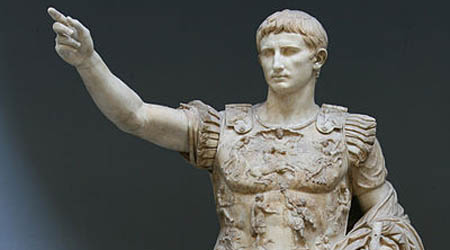Young Gaius's mother advised him to stay back in Greece and keep studying his philosophy and avoid getting killed.
小蓋烏斯的母親勸他留在希臘繼續(xù)學習哲學,避免被殺害。
But nobody, as it turned out, told Gaius Julius Caesar Octavianus what to do.
但是沒人告訴蓋烏斯·朱利葉斯·凱撒·屋大維應該做什么,
Within half a year young Octavian Caesar had formed the Second Triumvirate with Marc Antony and a nitwit named Lepidus.
半年后年輕的屋大維·凱撒已經和馬克·安東尼以及一個叫李必達的愚蠢之人組成了后三頭同盟。
Within two years, by forty two BC, the assassins and the Senatorial faction had been defeated for good.
兩年后,即公元前42年,他們徹底擊敗了凱撒的刺殺者和元老院派系。

By thirty one BC, Gaius Julius Caesar Octavianus, or Octavian as he is better known,
到了公元前31年,蓋烏斯·朱利葉斯·凱撒屋大維(通常被稱為屋大維)
was master of the entire Roman world and free at last to begin really solving Rome's political problems.
已經是整個羅馬世界的領袖,終于可以開始真正自如地解決羅馬的政治問題,
And then my friend you die, that's it.
這,我的朋友就是羅馬共和國的結束。
Segment ten E: Conclusions.
第十部分E:結論
One. Reigns of Terror.
一: 恐怖統(tǒng)治,
In its last century the Roman Republic experienced terrorism, organized and unorganized, from without and within.
羅馬共和國的最后一個世紀經歷了有組織或者無組織的外來的或者內部的恐怖主義。
King Mithridates's murder, in eighty eight BC, of eighty thousand Romans in the province of Asia ended one civil war,
公元前88年米特里達提在亞細亞省屠殺了8萬羅馬人結束了第一場內戰(zhàn),
the Social War, and set off another one between Sulla and Marius to see which of them would lead the Roman army.
即社會公戰(zhàn),并引發(fā)了另一場蘇拉和馬略之間爭奪羅馬軍隊領導權的戰(zhàn)爭,
Sulla's victory in the civil war that he fought on returning to Italy,
蘇拉回到意大利后在內戰(zhàn)中取得勝利,
was followed by mass murder of wealthy citizens,
接著大批殺害富有公民,
the so-called proscriptions, and a three-year dictatorship.
即所謂的死刑公告,并且蘇拉開始了三年的獨裁。
During the time of the First Triumvirate, rival gangs roamed the streets of Rome, sometimes in the pay of politicians and sometimes they were just freelancing.
在前三頭同盟期間,羅馬街頭幫派四起,這些幫派有時收受政治家錢財辦事,有時肆意起事。
Even the triumvir, Pompey himself, had to stay home sometimes, and this in a time of supposed peace.
即使是三頭之一的龐培自己,有時也得足不出戶避險,這還是在被看做和平的時期。
When Caesar and Pompey began their civil war in forty nine BC,
公元前49年凱撒和龐培開始內戰(zhàn)時,
Romans could be excused for expecting things to get nasty, but Caesar's remarkable policy of clementia, or clemency, limited the collateral damage.
羅馬人可以不必擔心事態(tài)變得可怕,因為凱撒不可思議的仁慈政策限制了戰(zhàn)爭的附帶損害。
Rome however was not out of the woods just yet.
但是羅馬還沒有脫離危險。
Caesar's death in forty four led to yet more public suffering.
44年凱撒的死給公眾帶來了更多的磨難。
It would take a rare leader indeed to extract Rome from this mess.
確實需要極為英明的領導者才能將羅馬拖出這混亂的境地。
Two. Men versus Society
二: 個人與社會之爭
Since the first Western historians were affluent upper-class males,
由于西方第一批歷史學家都是富裕的上流社會男性,
Western history has all too often been fixated on the military and political antics of affluent, upper-class males.
西方歷史學一直以來只著眼于富裕的上流社會男性的軍事和政治行為,
No argument there.
這是沒有爭議的
The Roman Republic was constructed in a way that restricted effective political power to wealthy citizen males,
羅馬共和國初建時就將有效政治權利限制在富裕的男性公民之間
and in its dying years it was controlled by a very small circle of wealthy citizen males.
在共和國最后時期,國家政治被一小圈富裕男性公民控制。
Then it was controlled three wealthy citizen males and ultimately by one wealthy citizen male named Julius Cesar.
然后被三位富裕男性公民控制,最終被一名富裕男性公民,即朱利葉斯·凱撒控制。
Yet the interplay of the First Triumvirate at the end of the Roman Republic is crucial to understanding its demise.
但是羅馬共和國末期前三頭同盟的相互作用對理解共和國的隕落極為重要。











